“When you’re out in the busy world, please be proud of Fordham, tell the Fordham story,” Joseph M. McShane, S.J., president of the University, told attendees. “What is the Fordham story? It’s your story, a story of the friendships you’ve made, the transformational nature of the education you received, and the great sense of community that was nurtured among you.”
That sense of community was on display across all of the Block Party events. From the separate cocktail receptions for five Lincoln Center-based schools to the open-air dance party uniting everyone on the plaza, alumni enjoyed the chance to recognize influential grads, faculty, and staff, and reconnect in person after last year’s virtual celebration.
For William Greene, a three-time Fordham graduate, this year’s Block Party was a chance to celebrate his many ties to the University. After graduating from Fordham College at Rose Hill in 1961, he earned a Fordham Law degree in 1965. Two decades later, he enrolled at the Gabelli School of Business, earning an M.B.A. in 1987.
“I always got more than my money’s worth at Fordham,” he said with a laugh. “I seemed compatible with the people—or at least they found me acceptable over a long period of time.”
Greene said that he practiced law for a number of years and served as executive director of the New York County Lawyers Association before deciding to make a career change. Earning a Fordham business degree, he said, helped him launch a career as a consultant.
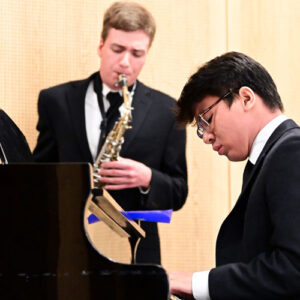
Two Fordham undergraduates—saxophonist Will Harvey and pianist Miguel Sutedjo, who has written classical, jazz, and musical theater pieces for both Fordham and as part of the Juilliard Evening Division program—kicked off the festivities with a musical performance in Pope Auditorium.
Each of the five schools—Fordham College at Lincoln Center, the Graduate School of Social Service, the Graduate School of Education, the School of Professional and Continuing Studies, and the Gabelli School of Business—held receptions where alumni, faculty, and administrators mingled. (Fordham Law School, also based at Lincoln Center, held its annual alumni reunion in April, and the Fordham Law Alumni Association hosted its annual luncheon on June 2.)
Other groups, such as The Observer—the award-winning student newspaper at Lincoln Center—and Psi Chi, the Lincoln Center psychology association, held their own alumni gatherings. Psi Chi honored John C. Hollwitz, Ph.D., professor of psychology and rhetoric at Fordham, and Leonard Davidman, Ph.D., GSE ’82, with its 2022 Psi Chi Outstanding Achievement medals. Earlier this year, Davidman, a licensed psychologist and longtime president of the labor union that represents New York City’s public sector psychologists and mental health counselors, was honored by Manhattan Borough President Mark Levine for his contributions to the city.
Honoring Lincoln Center’s First ‘Golden Rams’
When Pat Friel started at Fordham College at Lincoln Center in fall 1968, the Lowenstein Center was still under construction. She and her classmates took their first classes in the old Fordham Law building at 140 West 62nd Street, which was completely renovated after the new Fordham Law building opened in 2014.
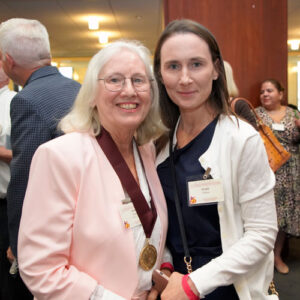
“It’s amazing to come back and see all the new renovations and even just floor by floor [in the Lowenstein Center], it’s just amazing. It really is beautiful,” said Friel, who graduated in 1972.
Friel and other members of the Fordham College at Lincoln Center Class of 1972 celebrated the 50th anniversary of their graduation, making them the school’s first-ever Golden Rams.
Friel said coming back and seeing the school in its current form, with two residence halls, additional classroom space, and a growing undergraduate population, makes her feel like the school has lived up to its initial goals.
“When we started, [there were] only 300 of us, and the idea behind the school was that it was supposed to represent the city,” she said. “It was supposed to be very diverse. … It was trying to be very reflective of the city. I am truly very glad that it became what it tried to be, and it continues to get better and progress.”
One of the people responsible for that progress was honored in a special ceremony at the reunion. Robert R. Grimes, S.J., FCRH ’75, dean of Fordham College at Lincoln Center from 1997 to 2018, was recognized for his two decades of “leadership of and commitment to” the FCLC community. A conference room in the dean’s office suite will be named in his honor.
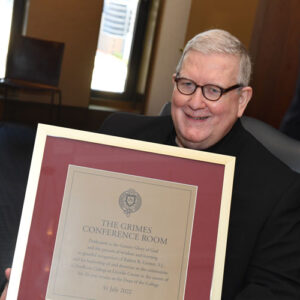
Block Party was a fitting place to honor Father Grimes, who helped inaugurate the alumni tradition in June 2001, when he worked with the alumni relations office to host a cocktail reception on the plaza.
“Graduates of every year of the college’s existence attended the event,” Father Grimes wrote in A History of Fordham College at Lincoln Center, a booklet he published in 2018 to mark the college’s 50th anniversary, “but unlike so many college reunions, large numbers of faculty also attended, renewing relationships forged in the classrooms of Lowenstein.”
In presenting Father Grimes with a framed version of the plaque that will be installed outside the conference room, Father McShane noted that the official date of the dedication is July 31—the feast day of St. Ignatius, founder of the Society of Jesus—calling it “a day on which Jesuits tend to celebrate real greatness.”
Elizabeth “Betty” Burns, FCLC ’83, a retired senior vice president of Capital Guardian and a Fordham University trustee fellow, credited her professors for helping her stay on track to graduate. At the time, she was working full days in the GM Building and attending school at night.
“One year I said I needed a semester off, and Clive Daniel, God rest his soul, said ‘Oh, no no no, you want to take one class; you can’t quit. If you take a semester off, we’ll never see you again,’” she recalled. She took her economics professor’s advice and earned her Fordham degree in 1983. “It’s just all the people at Fordham—they were just a part of this group that provided such camaraderie and such support.”
While some graduates were celebrating big milestone anniversaries, Laura Auricchio, Ph.D., was marking her first in-person Block Party as dean of the college. She took the time to thank and recognize Mark Botton, Ph.D., a professor of biology and co-director of the environmental science program, who retired this year.
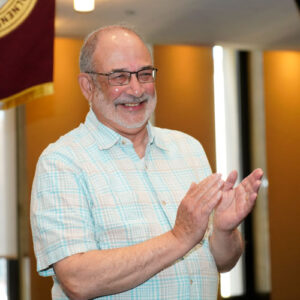
“We’re inaugurating yet another new tradition—honoring retiring faculty at Block Party,” she said.
Auricchio said that Botton, internationally regarded as an expert on horseshoe crabs, has published numerous scientific papers and helped policymakers and scientists protect the vulnerable arthropods and their habitats. In 2019, he even had a horseshoe crab fossil named after him.
“Most impressively to me, at least, is that many of his articles were published in collaboration with FCLC student co-authors,” Auricchio said to a room full of cheers.
At Gabelli School Reception, Honoring a ‘True Ph.D.’
Block Party also gave alumni an opportunity to thank two cornerstones of Fordham: Father McShane, who is stepping down as president at the end of the month, and Donna Rapaccioli, Ph.D., GABELLI ’83, who served as dean of the Gabelli School of Business for the past 15 years.
“Donna is a true Ph.D.—and not because she [earned a doctorate in] accounting at NYU,” said Mario Gabelli, a 1965 graduate of the Fordham business school that now bears his name. “The reason is that she is what I call passionate, hungry, and driven—Ph.D.”
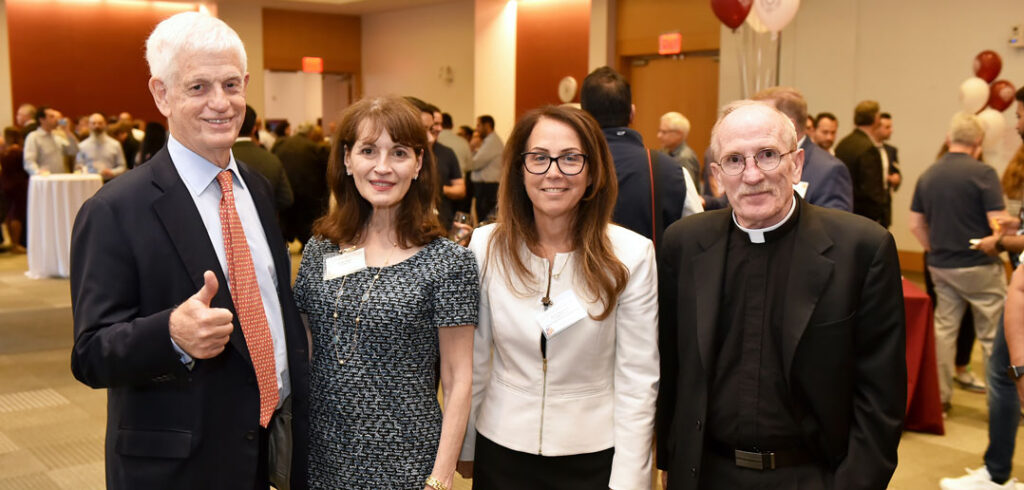
Gabelli said that Rapaccioli has been a true changemaker for students at the University, and now, as she steps back into teaching and research, students are going to “have to be summa cum laude to get into her class.”
“Donna, without you, we wouldn’t be here today,” he said.
In 2007, Rapaccioli was named dean of what was then the undergraduate College of Business Administration. During her tenure, Gabelli and his wife, Regina Pitaro, FCRH ’76, made two historic donations to the school—$25 million in 2010 and $35 million in 2020—giving the Gabelli School of Business its name and providing long-term support for academic programs, faculty research, scholarships, teaching excellence, and more.
In 2015, Rapaccioli led the unification of the University’s undergraduate and graduate business schools, one year after launching the school’s first B.S. program at the Lincoln Center campus. She later launched Gabelli’s first doctoral programs, and oversaw significant growth in enrollments and rises in rankings at the school.
“From that day, both the undergraduate and graduate divisions of what is now called the Gabelli School of Business—they took off,” Father McShane said. “There was a greater sense of purposeful education, of a purpose-driven career in business. She was adamant that a Fordham education was not going to be like any other business education. … She wanted men and women whose lives were marked by character. They had to be men and women of integrity.”
Gabelli thanked both Rapaccioli and Father McShane for their leadership at Fordham.
“Thank you for all you’ve done, and congratulations to both of you for your leadership, your wisdom,” he said. “Thank you [for helping] us motivate the next generation that’s here tonight.”
Recognizing Educators
This Block Party marked the first for José Luis Alvarado, Ph.D., who joined the Graduate School of Education as dean in July 2021. He presented GSE’s Lifetime Achievement Award to Aramina Vega Ferrer, Ph.D., GSE ’09, a member of the 12th Judicial District of the New York State Board of Regents.
“I can’t tell you how excited and honored I am to receive this award,” said Ferrer, who came to New York from Puerto Rico as a child. “Fordham has played a pivotal role in fulfilling the vision my parents held for me, my brother, and my sisters when we took that plane in 1952. They knew they had to seek to educate us in institutions that shared their values and religious beliefs.”
Ferrer, who spent more than three decades as an educator and educational leader before being elected to the Board of Regents in April, not only reflected on her family’s history but also looked to its future—and what education continues to mean to them.
“My three amazing grandsons are living proof that the richness of literacy and culture is transmitted across generations,” she told the attendees.
After Ferrer accepted her award, Father McShane spoke to the group of graduates, telling them, “You teach not only the skills that are necessary for students to succeed in life; you also teach values. … You spend your lives serving others. We cannot praise you enough. For me, you’re saints. You answer affirmatively to God’s invitation to help him build the human family up.”
GSS Introduces Alumni Awards
At the Graduate School of Social Service reception, Cassandra Agredo, GSS ’06, received the GSS Alumni Award, which “honors an individual who embodies professional social work values and meaningfully impacts the individuals and communities they serve.” Agredo is the executive director of Xavier Mission, which provides basic services as well as opportunities for empowerment and self-sufficiency to New Yorkers in need.
Mary Brennan, GSS ’83, received the GSS Alumni Service Award, which honors “an individual who is dedicated in their support of the Graduate School of Social Service and its mission.” Brennan is a social worker at 1st Cerebral Palsy of NJ, whose mission is to assist all students with special needs to lead more active and productive lives, and she has been a generous supporter of GSS.
Alumni from the classes of 1972 and 1997, who were celebrating their 50th and 25th anniversaries, respectively, also received special recognition at the event.
The Observer Launches New Prize
At a reception in Platt Atrium, Elizabeth Stone, Ph.D., professor of English and former adviser to The Observer, announced the creation of the Many Voices Prize, which will provide financial assistance to students from underrepresented backgrounds who contribute to the award-winning student paper.
“A couple of years ago, I noticed the editorial board [of The Observer] posted a notice saying that they were aware that as an organization, they didn’t have the diversity on staff they wished they could have,” she said. “That spoke to me, and it germinated in me the idea of wanting to do something to get historically underrepresented groups to the table.”
Stone said she hopes the prize will help more students find their calling as journalists.
“Right now, democracy is in big trouble, a trouble due to too many lies and too much silence, because not everyone who should be at the table is at the table,” she said. “And I believe journalism can help. To survive, we need robust conversation with many voices, at Lincoln Center and the world.”
Celebrating After Being Apart
The return of Block Party, which concluded with a night of dancing and celebrating out on the plaza, also gave more recent graduates a chance to reconnect with each other and their school. Some alumni said the pandemic helped them put their education and lessons learned at Fordham into practice.
Dan Nasta, FCLC ’19, said that he appreciated the liberal arts background that Fordham gave him as he navigated pandemic life.
“I just think a lot of what we encountered in the past two years with the pandemic was just empathy for other people and a willingness to put others before yourself,” he said. “I feel like I’m happy with how I’ve lived the past two years. I don’t have any regrets from a moral perspective, because Fordham gave me the ability to understand my actions and my responsibility for them and my connectedness to them as a part of the community.”
Chloe Djomessi Saikam, FCLC ’21, a former anthropology and music major, works as a UX designer, a role that helps create websites and products after considering how they will function and feel to those using them. She said that she tries to bring to her work the values and teachings of her liberal arts education.
“A lot of the concepts I learned about anthropology and music theory directly translate into design thinking—testing our own biases, really trying to understand people. and really just capturing the nuance, which is big in anthropology, and also big in UX,” Saikam said.
Additional reporting from Adam Kaufman and Connor White.

